Can I Sue a Trucking Co.? Ask an Injury Lawyer
- account_circle admin
- calendar_month Sen, 1 Sep 2025
- visibility 198
- comment 0 komentar

Can I Sue a Trucking Co.? Ask an Injury Lawyer
Can I Sue a Trucking Company? An Injury Lawyer Explains Your Rights
KlikBabel.com – Can I Sue a Trucking Co.? Ask an Injury Lawyer. A collision with a commercial truck is one of the most devastating events that can happen on the road. The sheer size and weight disparity between a semi-truck and a passenger vehicle often leads to catastrophic injuries and complex legal questions. While the truck driver’s actions may seem like the immediate cause, the path to justice and fair compensation often leads directly to the trucking company itself.
If you’ve been injured, you’re likely asking: “Can I sue the trucking company?” The answer is almost always yes. In fact, a lawsuit against the company is often more critical than one against the driver alone. An experienced truck accident injury lawyer will tell you that trucking companies can be held liable for an accident in several ways, opening the door for victims to recover the compensation they desperately need.
This article explores the legal grounds for suing a trucking company and why their liability often extends far beyond the driver behind the wheel.

Beyond the Driver: Why the Trucking Company is Often Liable
While a truck driver may be negligent, they are rarely the only party at fault. U.S. law provides several avenues to hold their employer accountable. The two primary legal theories are vicarious liability and direct negligence.
1. Vicarious Liability: When the Company is Responsible for the Driver
The most common way to sue a trucking company is through a legal doctrine called respondeat superior, or vicarious liability. In simple terms, this means an employer is legally responsible for the negligent acts of its employees, as long as those acts were committed within the scope of their employment.
If a truck driver causes an accident while on the clock—making a delivery, driving to a pickup location, or even returning to the depot—their employer can be held liable for the damages. This is crucial because trucking companies have significantly larger insurance policies and deeper pockets than individual drivers, which is essential for covering the severe damages common in truck accident cases.
2. Direct Negligence: Proving the Company Itself Was at Fault
More powerful than vicarious liability is proving the trucking company was directly negligent. This means the company’s own actions or inactions contributed to the crash. An investigation by a skilled attorney often uncovers systemic failures that put a dangerous truck on the road.
Common examples of direct company negligence include:
- Negligent Hiring and Training: Did the company hire a driver with a history of DUIs, reckless driving, or previous accidents? Did they fail to provide adequate training on safety procedures, vehicle operation, or federal regulations?
- Improper Maintenance: Federal law mandates strict inspection and maintenance schedules for commercial vehicles. If an accident was caused by faulty brakes, worn-out tires, or a broken signal light, the company can be held liable for failing to maintain its fleet in a safe, roadworthy condition.
- Encouraging Hours-of-Service (HOS) Violations: The Federal Motor Carrier Safety Administration (FMCSA) sets strict limits on how long a driver can be on the road without rest to prevent driver fatigue. Some companies pressure drivers to break these rules to meet unrealistic deadlines. If fatigue was a factor, the company’s policies are directly to blame.
- Improper Cargo Loading: Overloaded or improperly secured cargo can shift during transit, causing a driver to lose control or the truck to tip over. The company that loaded the cargo—whether it was the trucking company or a third party—can be held liable for this negligence.
The Crucial Evidence in a Truck Accident Case
Suing a multi-million-dollar trucking company and its insurance provider is not simple. They have aggressive legal teams dedicated to minimizing payouts. To build a strong case, your attorney will need to preserve and analyze critical evidence, including:
- The Truck’s “Black Box” (ECM): The Electronic Control Module records vital data like speed, braking, RPMs, and hours of service. This data is often crucial for proving what really happened moments before the crash.
- Driver Logs and Records: These documents show the driver’s hours, rest breaks, and compliance with FMCSA regulations.
- Maintenance and Inspection Records: These can reveal a pattern of neglected repairs or shoddy maintenance.
- Company Hiring Policies and Driver’s File: This can establish a history of negligent hiring or retention.
- Post-Accident Drug and Alcohol Test Results: Federal law requires these tests after any serious commercial truck accident.
An experienced truck accident lawyer knows how to send a spoliation letter immediately, legally demanding that the trucking company preserve this evidence before it is “lost” or destroyed.
Don’t Face Them Alone: Speak with an Experienced Truck Accident Lawyer
The aftermath of a truck accident is overwhelming. While you focus on your physical recovery, the trucking company and its insurers are already building a defense. They are not on your side. By holding both the driver and the company accountable, you can seek compensation for medical bills, lost wages, future medical care, pain and suffering, and more.
You have the right to sue a trucking company for the harm their operations have caused. The key is to act quickly and partner with a legal team that understands the complexities of federal trucking regulations and has the resources to fight for you.
Frequently Asked Questions (FAQ)
1. What if the truck driver was an independent contractor?
This is a common defense tactic used by trucking companies to avoid liability. However, even if a driver is classified as an “independent contractor,” the company may still be held liable. An attorney can investigate the true nature of the relationship. If the company exerts significant control over the driver’s work—such as setting their routes, requiring company logos on the truck, or controlling their schedule—a court may still consider them an employee for liability purposes.
2. How long do I have to file a lawsuit after a truck accident?
Every state has a law called the “statute of limitations,” which sets a strict deadline for filing a personal injury lawsuit. This deadline can be as short as one year in some states, or up to three years or more in others. If you miss this deadline, you will lose your right to sue forever. It is absolutely critical to speak with an attorney as soon as possible after an accident to protect your legal rights.
3. What are the most important things to do immediately after a truck accident?
First, call 911 to report the accident and request medical assistance, even if you feel fine. Second, if you are able, take photos and videos of the accident scene, including vehicle damage, road conditions, and any visible injuries. Third, get the truck driver’s information, the trucking company’s name, and the contact information of any witnesses. Finally, do not give a recorded statement to any insurance adjuster without first consulting with a truck accident lawyer.
- Penulis: admin












Saat ini belum ada komentar